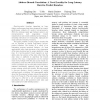123 search results - page 1 / 25 » Improving Branch Predictors by Correlating on Data Values |
MICRO
1999
IEEE
13 years 9 months ago
1999
IEEE
Branch predictors typically use combinations of branch PC bits and branch histories to make predictions. Recent improvements in branch predictors have come from reducing the effec...
HPCA
2007
IEEE
14 years 5 months ago
2007
IEEE
If-conversion is a compiler technique that reduces the misprediction penalties caused by hard-to-predict branches, transforming control dependencies into data dependencies. Althou...
HPCA
2003
IEEE
14 years 5 months ago
2003
IEEE
To continue to improve processor performance, microarchitects seek to increase the effective instruction level parallelism (ILP) that can be exploited in applications. A fundament...
ICS
2009
Tsinghua U.
13 years 2 months ago
2009
Tsinghua U.
Modern processors require highly accurate branch prediction for good performance. As such, a number of branch predictors have been proposed with varying size and complexity. This ...
HPCA
2008
IEEE
14 years 5 months ago
2008
IEEE
Hard-to-predict branches depending on longlatency cache-misses have been recognized as a major performance obstacle for modern microprocessors. With the widening speed gap between...

